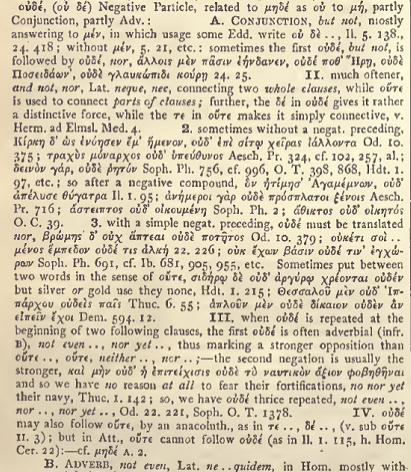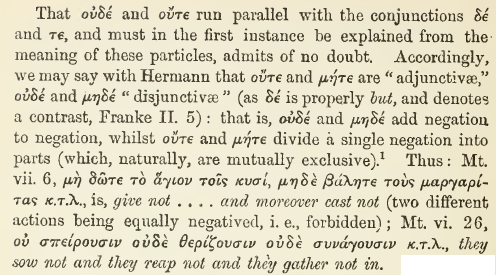 ‘I do not permit a woman to teach, nor to exercise authority over a man, but to be in quietness,’
‘I do not permit a woman to teach, nor to exercise authority over a man, but to be in quietness,’
the scripture says (1 Timothy 2:12), but now many are pretending that Paul was prohibiting only a certain type of teaching by women. Thus, in his Grove Booklet, ‘Women and Authority: The key biblical texts,’ Ian Paul has written that a paraphrase might be:
‘I am not permitting women to teach in such a way as to misuse authority in a domineering way [over men].’
Similarly, in her submission to the Reform-Awesome Consultation concerning the proposed admission of women to the office of bishop in the Church of England, Emma Ineson claimed that:
‘The sentence could be accurately translated: “I do not permit a woman to teach so as to gain mastery or domination over a man”.’
No, it can not be ‘accurately translated’ that way. It doesn’t mean that at all. Let us have a look at the original text:
διδάσκειν δὲ γυναικὶ οὐκ ἐπιτρέπω, οὐδὲ αὐθεντεῖν ἀνδρός, ἀλλ’ εἶναι ἐν ἡσυχίᾳ.
Let’s take this word by word, so that those who know only a little or no Greek can get the idea:
διδάσκειν – present infinitive of διδάσκω ‘to teach’ – so, ‘to teach’ or ‘to be teaching’;
δέ is a mildly adversative sentence connector, which can be variously translated ‘and’ or ‘but’ or ‘now’ or ‘then’ or left untranslated;
γυναικὶ – dative of γυνή ‘a woman, or wife’ – so, ‘to a woman’ [as in English we give permission to someone]
οὐκ is οὐ, meaning ‘not’;
ἐπιτρέπω 1st person present indicative of ἐπιτρέπω, ‘to permit, allow’ – so, I permit;
οὐδέ is a negative conjunction: ‘and not, nor, neither’;
αὐθεντεῖν present infinitive of αὐθεντέω ‘to exercise authority, to assume a stance of independent authority, to dictate to’;
ἀνδρός – genitive of ἀνήρ ‘a man, or husband’;
ἀλλά is an adversative particle: ‘but’;
εἶναι – present infinitive of εἰμί ‘to be’ – so, ‘to be’;
ἐν is a preposition: ‘in’;
ἡσυχίᾳ – dative of ἡσυχία: ‘quietness, or silence’.
Putting that together, we have:
‘Now, I do not permit a woman to teach, nor to exercise authority over a man, but to be in quietness.’
Although it is not central to my purpose here, it has to be said at this point that some modern translations read along the lines of:
‘I do not permit a woman to teach or to exercise authority over a man, but to be in quietness.’
leaving some ambiguity as to whether it is only teaching men that is not permitted, or even:
‘But I do not allow a woman to teach or exercise authority over a man. She must remain quiet.’ [NET Bible]
which makes it appear that Paul is prohibiting only the teaching of men, rather than teaching per se.
I have checked many of the older commentaries on the Greek text (Chrysostom, Calvin, Ellicott (1856), Fairbairn (1874), Huther/Hunter (1881), Plummer (1884), Humphreys (1897), Bernard (1899), William Kelly (1913), Faulkner Brown (1917), Lock (1924), and J MN D Kelly (1963)) and none of them even consider the possibility that ἀνδρός is the object of διδάσκειν in this sentence. William Kelly, for example, renders it as:
‘But to teach I permit not a woman nor to exercise authority over a man, but to be in quietness.’
saying explicitly (note, p.66) that he is imitating in English the emphatic place given to διδάσκειν at the head of the sentence.
Nevertheless, I am willing to concede for now that it may be at least a theoretical possibility that ἀνδρός is the object of διδάσκειν. Even if that were the case, there would still be two prohibitions in view: the teaching of men, and the exercising of authority over men.
My purpose here, rather, is to persuade the reader that οὐδέ can not mean ‘so as to’ or ‘in such a way as to’, and thus serve to limit the first prohibition rather than to add a second one. A good place to start in determining the meaning of a word is to look it up in a dictionary. So let us begin with a lexicon, and then move on to the grammars. It is an extremely common word, so it is unthinkable that scholars have been unable to determine its meaning until the recent past. Here is the primary classical lexicon, Liddell and Scott:
Several points should be noted from this definition. First, οὐδέ is formed from οὐ and δέ, both of which we have met already. Just as δέ can mean either ‘and’ or ‘but’, so οὐδέ, can mean either ‘but not’ (A.I above,) or “much oftener,” connecting two whole clauses, (as it does in 1 Timothy 2:12) it can mean ‘and not, nor’ (A.II.) Notice however that even in the second case, ‘the δέ in οὐδέ gives it rather a distinctive force,’ that is, that the second clause is made distinct from the first to some degree.
Second (A.II.3,) ‘with a simple negative proceeding’ (as is the case in 1 Timothy 2:12,) ‘οὐδέ must be translated nor.’ This is very simple. The first example given is from Homer’s Odyssey, 10.379, which reads:
‘τίφθ᾽ οὕτως, Ὀδυσεῦ, κατ᾽ ἄρ᾽ ἕζεαι ἶσος ἀναύδῳ, θυμὸν ἔδων, βρώμης δ᾽ οὐχ ἅπτεαι οὐδὲ ποτῆτος;
“‘Why, Odysseus, dost thou sit thus like one that is dumb, eating thy heart, and dost not touch food or drink?..” [Trans. A. T. Murray]
Since this seems slightly at odds with Lidell and Scott’s injunction that ‘οὐδέ must be translated nor,’ we may note that in a negative sentence, ‘or’ has much the same sense as ‘nor.’ ‘He does not touch food or drink’ has virtually the same meaning as ‘he touches neither food nor drink’. We may note also that, perhaps for the sake of brevity in a dictionary, οὐδέ is here connecting words rather than clauses, as again in their second example from The Odyssey 22.226:
‘οὐκέτι σοί γ᾽, Ὀδυσεῦ, μένος ἔμπεδον οὐδέ τις ἀλκή οἵη
“Odysseus, no longer hast thou steadfast might nor any valor,..” [A. T. Murray]
Third, οὐδέ is also used adverbially (Section B above, which I have omitted) when it means ‘not even,’ but there has been no suggestion that it is so used in 1 Timothy 2:12.
Now let us look at the leading grammar of classical Greek, Herbert Smyth’s ‘Greek Grammar for Colleges’:

(μηδέ is similar to οὐδέ.Whereas οὐδέ is normally used with a verb in the indicative mood, μήδε is employed with other moods. οὔτε and μήτε are usually doubled, as in οὔτε.. οὔτε, μήτε.. μήτε, and mean ‘neither.. nor.’ These words need not concern us directly here, but will be met again in the grammars below.) I omit Section 2931 which concerns οὐδέ as an adverb. Then, at Section 2932, regarding οὐδέ as a conjunction we have:
According to Smyth, οὐδέ means ‘and not, nor’. There are other sections which touch on the use of οὐδέ, but I don’t believe any are of relevance to 1 Timothy 2:12, where it ‘connects two or more whole clauses,’ as in Section 2932.
Had οὐδέ changed its meaning in any way by the time Paul wrote his first letter to Timothy? Here is the most authoritative grammar of New Testament Greek, known as BDF (Blass, Debrunner, Funk):
It is stated clearly that its use is the same as in classical Greek. Although the heading might suggest otherwise, οὐδέ is being classed here as a connective, not as a correlative. For a demonstration of this, here is Blass-Debrunner (2nd ed, 1905, p.265), from which BDF was derived:
οὐδέ connects two negative clauses. It’s as simple as that.
George Winer (translated by Moulton,) gives a fuller discussion in his ‘Grammar of New Testament Greek’:
τε, referred to in the following extract, is a particle that adds an element to a previous one, and is therefore often termed ‘adjunctive.’ Frequently it may be translated as ‘and.’
Thus, οὐδέ (and μηδέ) ‘add negation to negation.’ Consider the example cited, from Matthew 7:6
Μὴ δῶτε τὸ ἅγιον τοῖς κυσίν, μηδὲ βάλητε τοὺς μαργαρίτας ὑμῶν ἔμπροσθεν τῶν χοίρων, ..
Do not give what is holy to dogs, and do not throw your pearls before swine, ..[NASB]
and Winer’s comment that ‘two different actions [are] equally negatived, i.e. forbidden.’ Although this particular example concerns μηδέ, it is clear that the principle that he is illustrating applies to οὐδέ too.
I rest my case. οὐδέ adds one negative statement to another. Thus, in 1 Timothy 2:12, to Paul’s first prohibition ‘I do not permit a woman to teach,’ it adds a second ‘nor to exercise authority over a man.’ The meaning is clear, and we must obey it.
Andrew







